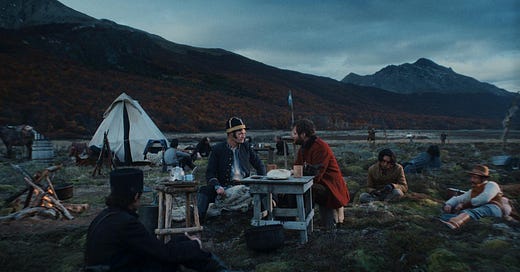The Settlers (Felipe Galvez, 2023)
The Settlers, a revisionist Western about the colonization and settlement of Chile, contrasts its austere visual language with shocking violence. In the film’s opening scene, pastoral, watercolor vistas of a Patagonian farm are interrupted by the abrupt murder of a man who lost his arm operating the farm’s machinery. The man committing the murder is Lieutenant MacLennan, a former member of the British Army stationed in Chile. Shortly after our introduction to his cruelty, MacLennan, along with an American mercenary and one of his mestizo farm hands, embarks on a mission to euphemistically cleanse the lands of Chile and Argentina for a Spanish nobleman.
More than the Western, Galvez is really in conversation with myth-making, and his direction takes equal inspiration from Leone and Ford as it does from painting. Often shooting with pointedly artificial lighting even as the film is shot on location, Galvez shoots grisly scenes of genocide as if they were works from the great masters (think Washington Crossing the Hudson). The method recalls the likes of Zama and especially Jauja, and Galvez builds on this South American cinematic lineage by confronting colonial mythological imagery with the brutality involved in its creation. Given this framework (the coexistence of violence and colonial aesthetics), a lot of what’s initially strange about The Settlers quickly falls into place. The most jarring departure from arthouse austerity is the performance of its two primary white characters, both of whom engage in animalistic histrionics throughout the film. It’s clear that their garish performances are meant to be a violent foil to the meditative stereotype of arthouse filmmaking (perhaps too clear in one of the film’s only overtly comedic scenes, where a bunch of colonists arm wrestle and box each other). Perhaps what’s most disappointing about The Settlers, and what kept me mostly at an impressed remove, is that for much of its runtime, the film feels too pat, lacking the palpable sense of the metaphysical or the subconscious evoked by the likes of Martel and Alonso.
The Settlers becomes progressively more interesting in its final 30 minutes, first with a concerted change of perspective towards Segundo, the mestizo, and then with two flash forwards. Just 7 years after the film’s preceding events, MacLennan is dead, and in this time period’s equivalent of liberal urban centers, he’s an infamous figure whose violence is widely frowned upon. As nationalists in Santiago begin the work of turning Chile into a nation, ostensibly for both Spanish and Indigenous peoples, one of their leaders makes a film meant to seek justice for McLennan’s crimes against indigenous Chileans. In these scenes, The Settlers becomes a response to the conformist politics of the “white guilt” movie, treating this type of aesthetic, and its posturing as a sort of justice, as another form of oppressive colonial violence. As an indigenous woman refuses to follow the white nationalist’s film direction, a veiled threat is made: “Do you want to be a part of this nation?".




